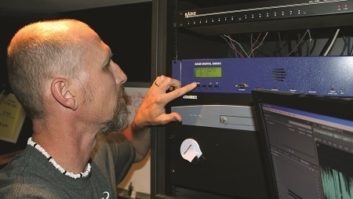To all the broadcasters and manufacturers who moved heaven and Earth to meet the FCC’s deadlines for the installation of Common Alerting Protocol-compliant EAS gear, even as those deadlines were extended, a decision now out of the commission to smackdown companies who waited too long to comply will seem interesting.
Saying they waited too long to install CAP-EAS encoders/decoders for business-related reasons, the FCC denied waivers for a group comprised of mostly cable system operators.
Those applying for waivers of the June 30, 2012 deadline to install and make sure their CAP-compliant EAS was operational were: Southern Communications Volunteers, Inc. (WEVL(FM), Cordova, Tenn.), Applegate Media, Inc. (KAPL(AM), Phoenix, Ore.), Telecommunications Management, LLC and Avenue Broadband Communications, Inc., (called New Wave), Lakeview Cable, Inc., RB3, LLC and Arklaoktex, LLC, known as Reach Broadband. New Wave, Lakeview and Reach filed requests for waivers on behalf of several cable systems.
On Sept. 30, 2010, FEMA published the technical standards and requirements for CAP-formatted EAS alerts. That triggered a 180-day FCC clock for EAS participants to be able to receive those alerts. The commission defines “EAS participants” as radio and television stations, cable operators, satellite radio and television service providers, and wireline video service providers.
The FCC then extended the deadline for everyone to buy and install CAP-complaint encoders/decoders to Sept. 11, 2011 and yet again to June 30, 2012 as broadcasters and others cited the need to pay for and devote resources to the equipment installations, and manufacturers said they needed time to ramp-up to meet the spike in demand.
SCV, New Wave, Lakeview, Reach, and Applegate asked for waivers, saying they couldn’t meet the June 30, 2012 deadline because of vendor delay.
In his decision, FCC Public Safety & Homeland Security Bureau Chief David Turetsky said vendor delay alone does not qualify as a special circumstance to qualify for a waiver, saying “the delay must have arisen from some event or events that occurred despite petitioner’s diligent business operations, and not as a result of petitioner’s actions.”
The FCC can tell by the submission dates when SCV, New Wave, Lakeview, and Reach submitted their waiver requests that they waited until close to the deadline to order equipment, and that any delay in actually receiving the gear was “attributable to each company’s business decisions.”
SCV told the agency it has a long-standing relation with its vendor and didn’t place an order until May 24, 2012 because the vendor previously shipped “within a matter of days.” Further, SCV had to wait for its fund drive to end. New Wave argued its regular vendor told the company in April, 2012 that the gear was on backorder and would not be delivered in time to meet the June deadline. New Wave tried other vendors but eventually ordered from its preferred vendor.
Lakeview and Reach also tried to order close to the deadline and were told their vendors couldn’t deliver in time. The FCC tried to get more information from Applegate as to why it waited so long to order, but the agency says it has no such explanation.
Turetsky says in the decision the FCC finds the “lack of due diligence shown by the petitioners to obtain the required equipment in a timely fashion is inconsistent with the public interest,” and that’s why he denied the waiver requests.
The decision does not explain whether the companies will be fined.



